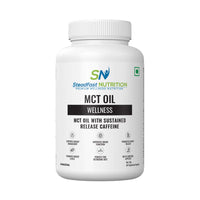What is MCT Oil?
MCT Oil is a dietary supplement derived from a type of fat known as medium-chain triglycerides (MCTs). Compared to most fats you consume, the molecules in MCTs are smaller, making them easier to digest. Once ingested, MCTs are rapidly absorbed and circulated into the bloodstream, where they are converted into usable energy.
So, what makes MCTs unique? They're easier for your body to digest compared to triglycerides with longer chains, known as long-chain triglycerides or LCTs.
Where Does MCT Oil Come From?
These are fatty acids, typically sourced from coconut or palm kernel oil, which naturally contain MCTs and certain dairy products. Let's simplify it: triglyceride is a type of fat and the most common fat found in your body. Triglycerides are made up of chains of atoms, which can be short, long, or medium-length. MCTs fall into the category of medium-length chains.
The process of obtaining MCT oil from coconut or palm kernel oil involves fractionation, which separates the MCTs from the original oil and concentrates them for use as a supplement.
MCT Oil Uses
MCT oil supplements have been widely explored for their potential health benefits, with research focusing on areas such as exercise endurance and neurodegenerative diseases. Here are some common uses and the scientific evidence behind them:
1. Exercise Endurance:
MCTs are often sought by athletes for potential performance and endurance benefits. Their rapid digestion suggests they may serve as a quick energy source during physical activity. Over the years, MCTs have demonstrated diverse physiological effects beyond energy provision, including enhancing fat oxidation, which has spurred interest in their potential for reducing body fat and improving exercise endurance.
2. Neurodegenerative Diseases:
It has been explored as a potential treatment for conditions like epilepsy and Alzheimer's disease (AD). Some studies have shown promising results, such as a significant reduction in seizures among adults with epilepsy who supplemented with MCT oil.
3. Promotes Gastrointestinal Health:
MCT oil supports a healthier gut microbiome and strengthens the intestinal barrier, potentially preventing bacteria in the GI tract from becoming unbalanced (dysbiosis) and improving gastrointestinal and metabolic health.
4. Aids in Weight Loss:
Studies suggest that MCTs may modestly benefit weight loss efforts. Compared to long-chain triglycerides (LCTs), MCTs have been associated with greater reductions in overall weight, waist and hip circumference, and body fat, possibly due to their effects on appetite regulation, feelings of fullness, and calorie/fat burning.
5. Reduces Inflammation:
MCT oil exhibits anti-inflammatory properties by lowering pro-inflammatory cytokines and increasing anti-inflammatory cytokines. It is more effective than other oils in reducing inflammation, as evidenced by studies on preterm newborns and adults.
6. Boosts Heart Health:
Despite being primarily composed of saturated fats, MCT oil is regarded as heart-healthy - following a ketogenic diet supplemented with it may aid in weight loss, potentially reducing the risk of heart disease. Incorporating MCT oil into your diet can also assist in lowering LDL (the "bad") cholesterol levels while simultaneously boosting HDL (the "good") cholesterol.
Dietary Sources of MCT Oil
MCT oil supplements are widely used to increase its intake, but there are alternative dietary sources as well. Here are some foods that naturally contain MCTs:
1. Coconut oil: It is one of the richest sources of MCTs, particularly lauric acid, caprylic acid, and capric acid.
2. Palm kernel oil: Similar to coconut oil, palm kernel oil contains significant amounts of MCTs, making it another natural source.
3. Butter: While not as high in MCTs as coconut or palm kernel oil, butter contains small amounts of these beneficial fatty acids.
4. Whole milk: Dairy products like whole milk contain MCTs, particularly in the form of medium-chain fatty acids.
5. Cheese: Certain types of cheese, especially those with higher fat content, can provide MCTs.
6. Yoghurt: Full-fat yoghurt contains MCTs, making it another option for increasing your intake of these fatty acids.
Incorporating these foods into your diet can be a natural way to obtain MCTs, along with the option of using MCT oil supplements.
MCTs and the ketogenic diet
Fats comprise chains of carbon atoms, with the majority of dietary fats containing 13 to 21 carbon atoms, known as long-chain fatty acids. Conversely, short-chain fatty acids consist of 6 or fewer carbon atoms.
Medium-chain triglycerides (MCTs) fall between these two types in terms of carbon atom length, typically ranging from 6 to 12 atoms. Found in coconut oil, MCTs are metabolised differently by the body compared to long-chain fatty acids. Instead of being every-time processed through the lymphatic transporters like other fats, MCTs travel directly from the gut to the liver. Here, they serve as a rapid source of energy or are converted into ketones when the carbohydrate intake is low.
Ketones are byproducts generated when the liver breaks down a substantial amount of fat. They can serve as an alternative energy source for the brain, replacing glucose or sugar. Because the calories from MCTs are promptly utilised, they are less likely to be stored as fat. This concept forms the foundation of the ketogenic diet, which many people believe to be an effective method for weight loss.
Varieties of MCT oil
There are several types of MCT oil available on the market, each containing a different composition of medium-chain triglycerides (MCTs). The main types are:
C6 (Caproic Acid):
While less common, C6 MCT oil contains caproic acid, which is the shortest chain MCT. It metabolises quickly but has a slightly bitter taste and may cause gastrointestinal discomfort in some individuals.
Caprylic Acid (C8):
This type of MCT oil contains primarily caprylic acid, which is quickly converted into ketones and provides a rapid source of energy. C8 MCT oil is often preferred for those following ketogenic diets or seeking immediate energy boosts.
Capric Acid (C10):
Capric acid is another type of MCT that is metabolised relatively quickly and efficiently by the body. It provides sustained energy and may offer benefits similar to C8 MCT oil, although it takes slightly more time to absorb to provide sustained energy.
Lauric Acid (C12):
Lauric acid, also called dodecanoic acid, contains 12 carbon molecules, making it slower to digest due to its longer carbon chain. However, it still possesses antimicrobial properties and offers several health benefits. It's worth noting that pure MCT oil often excludes lauric acid.
How to Use MCT Oil
MCT oil is a versatile and flavourless addition to various foods and beverages, commonly used in smoothies, salad dressings, and coffee. However, it's not suitable for frying due to its low smoke point. The recommended daily intake of it depends on individual tolerance and desired benefits, typically ranging from 4 to 7 tablespoons spread throughout the day. Additionally, since MCT oil lacks essential fatty acids, it's essential to incorporate other healthy fats into your diet for balanced nutrition.
Risks Related to MCTs
While MCT oil is typically well-tolerated, it's crucial to acknowledge that higher doses can initially lead to gastrointestinal issues like nausea, abdominal cramps, vomiting, and diarrhoea in certain individuals. To address these potential side effects, it's advisable to start with a small dosage, such as 1 teaspoon of MCT oil, and gradually increase intake over time. This incremental approach can help your body adjust to the supplement more comfortably.
Incorporating healthy fats into our diets is essential for optimal bodily function. MCT oils, which are easily absorbed and provide energy, offer various studied health benefits such as enhanced cognitive function and weight loss. If you're new to using MCT oil, start with one to two teaspoons per day to gauge its effects. While there's no overnight solution for achieving health goals, research indicates that adding this to your daily routine may offer benefits including improved brain, heart, and gastrointestinal health, and supporting weight loss.


